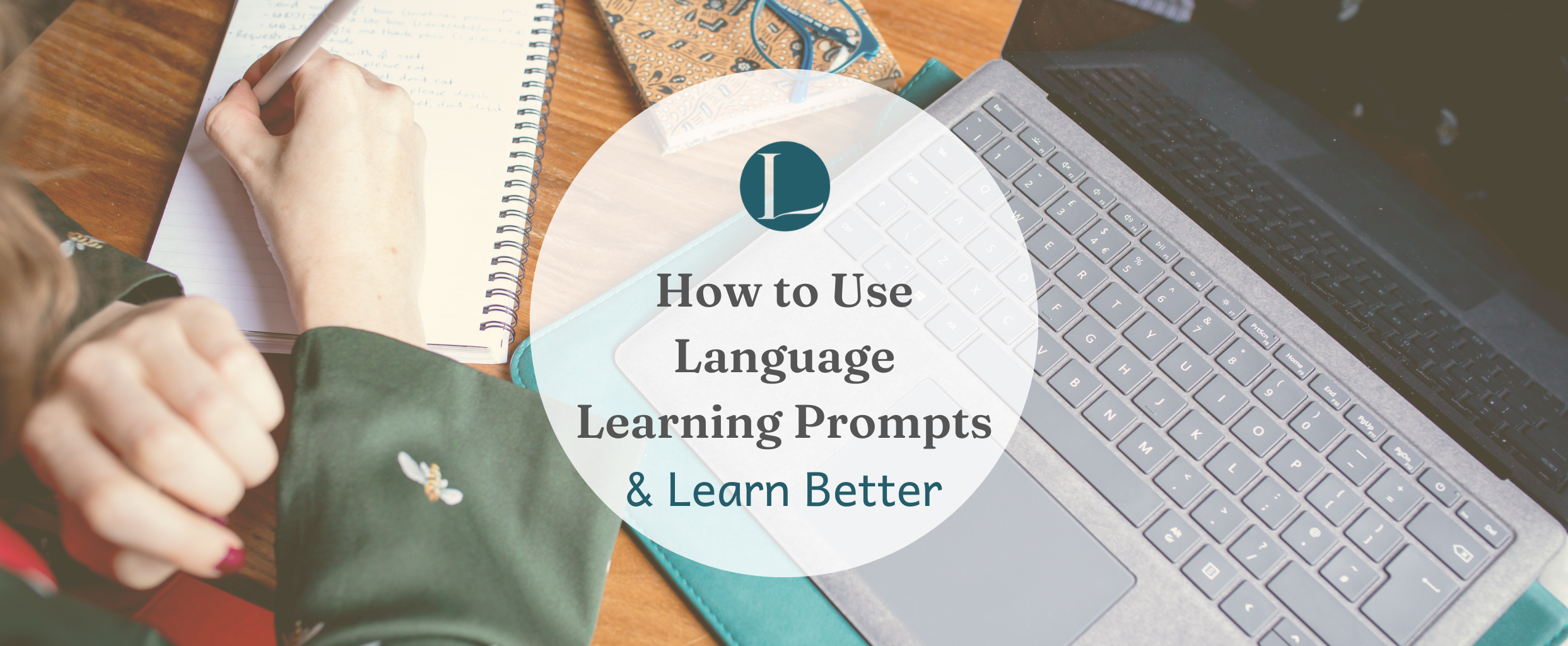Blog How To Learn A Language Podcast
September 23rd, 2024
How to Use Language Learning Prompts
Prompts are a great way to always have something to practise for your languages. Here’s how to use language learning prompts to practise languages.

Before we begin…
The Video
The Podcast
How to Use Language Learning Prompts
How to Use Language Learning Prompts for Writing & Speaking
Prompts are generally used for writing and speaking – your output, or creating.
There’s some different approaches I take here depending on what my goals are, how much time I have, and how I’m feeling.
Follow the Spark
If there’s something about a prompt that’s caught my interest right away, I tend to follow that spark.
Rather than try to do more research and find other ways to use it, if an idea has come, stick with it.
This works really well when I’m after something quick and easy.
Task-Based & Functional
Sometimes, you’ve got more energy and focus to give to a writing or speaking prompt.
That’s when I opt for something task-based and functional.
That means I’m not “just writing” or “just speaking” and timing it or logging my word count.
Instead, it’s things like “write an email“. I can then more specific with that as suits me.
For example, will it be a formal email for work or an email to a friend? A complaint email to a company or a Christmas Round Robin email to lots of people I know?
Getting specific with the task can help to take prompts down unexpected paths as well as help you to practise specific relevant scenarios.
Creative & Playful
It’s not just a matter of energy or focus, sometimes you just don’t feel like going down the functional, task-based route.
On those days, let yourself explore some creative writing.
Get playful with poems, word play, rhyming, finding idioms and more.
No-one needs to hear or read what you create, just you.
So don’t be embarrassed to play with language when the mood takes you.
How to Use Language Learning Prompts for Reading & Listening
Prompts aren’t just good for writing and speaking. There’s plenty of ways you can use them as inspiration for reading and listening too – your input, or consuming.
Research the Topic
Prompts can act as a great start point for further research into a topic. And you get to choose what form that takes too.
Whether it means you read on Wikipedia, or listen on YouTube or podcasts, there’s no rules here.
It’s also a good chance to bring in your own interests too.
For example, if the prompt is ‘red’ and you love music, can you find some songs in the language you’re learning that have the word ‘red’ in the title?
You’ve then got the lyrics to read and the song to listen to.
Expert Opinions
That research phase could easily lead to finding expert opinions related to a prompt topic.
For example, articles or podcasts featuring or interviewing experts.
This helps you expand your understanding and vocabulary around a particular topic.
You certainly don’t need to understand every word flawlessly, that’s rarely the goal.
But simply being open to expose yourself to more discussion on a particular topic all helps towards a better understanding. All inspired by one prompt!
Texts for Language Learners
A lot of the research phase and expert opinions will typically be in quite advanced language.
Which is great…unless you’re a beginner and feel real blocks around native level content.
You can use a prompt to inspire a search for learner friendly content too.
Try asking ChatGPT to create a short text for your level.
Something like this prompt template will help: “I am a [level] [language] learner. Please create a short text in [language] around [number] words based on the topic of [prompt/prompt topic]. I would especially like to see [grammar/vocab you want to focus on] included. Show a cloze version with [number] words missing. Then show the full text. Then ask [number] questions. Do not show me a translation or answers to the questions until I request it. Thank you.”
I like to think the robots will remember me saying please and thank you, and spare me when they take over.
Alternatively, a language resource like BeeLingua may have texts about the prompt topic you’re after.
How to Use Language Learning Prompts for Self-Review
The final stage when I’ve got time is to do some self-review.
This means checking back over what I’ve created or consumed, making corrections (to my own writing and speaking!), and then deciding what’s worth learning and remembering.
The next stage is to then add any new vocab to my preferred place. For me right now, that’s Mochi.
It could also be Anki, Clozemaster, paper flashcards, or simply practising in a paper notebook.
You’ll know what works best for you at this stage, if it’s needed, so trust yourself here.
Join Promptly for the How To Get Good at Self-Review Workshop
There’s a workshop on this exact topic to Promptly.

Promptly is my subscription for language learners who are done with saying they’ll be fluent “one day”. Speak more, write more, get fluent promptly.
Every single week, you get a brand new writing and speaking prompt complete with multiple suggestions on how to use that prompt at different levels, and a video walkthrough for further ideas.
As well as the workshop How To Use Any Prompt At Any Level, you also get How to Get Good at Self-Review.
You’ll be able to finally look back over what you write and speak without feeling awkward or being too critical or soft.
Promptly is just $10 USD per month, which means you could easily scrap a streaming service and start to create not consume!
Ready to go? Join Promptly to get started here and see the How To Get Good at Self-Review workshop.







